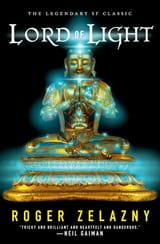This is a quick 'review' of Lord of light i wrote to my friend:
[1/2] The book came out in 1967, right in the middle of the hippie movement. Honestly, it wouldn’t surprise me if Zelazny was writing on acid – the style is all over the place. You can read it as both fantasy and sci-fi (as he himself claimed), but in reality it leans much more toward fantasy.
Fun fact: there was once talk about adapting it into a movie, but that never happened. However, in 1980 the CIA actually used the cover story of a Lord of Light movie crew scouting locations in Tehran, when in fact they were there to pull off a rescue mission. That whole operation later became the basis for the 2012 film Argo.
As for the novel itself – I get that back in the late 60s it must have felt unique. Zelazny was trying to blend sci-fi with Buddhism, Eastern mysticism, and myth, which was trendy at the time (think Beatles in India, Sgt. Pepper, all that). But I’m not sure he completely pulled it off. Personally, I found the book exhausting at times. I had to force myself through the last 80 pages.
The structure is strange: one chapter reads like a mythological tale with biblical language, describing the gods and their temples in huge detail, but the characters feel flat. Besides the main protagonist, most of them are barely interesting or even memorable – everyone has multiple names and it’s hard to care about them. Then, suddenly, the style shifts and they’re drinking, smoking, and talking like everyday people. It’s jarring. Historically, I get why it was influential, but as a reader today it just feels clumsy.
The premise: humanity colonizes a planet inhabited by “demons” and mythical beings. A small group of humans consolidates power, creating a theocracy. When people die, their karma is judged via a “psychic probe” in the so-called karmic temple, and their soul is transferred into a new body. If you’ve been bad, you might come back as a dog; if you’ve been pious, you get a healthy new body. The rulers, seen as gods, wield mysterious “powers” supposedly explained by advanced technology – though it’s never really clear how any of it works. The book wants you to accept it at face value, half science, half mythology.
So yeah, Zelazny throws in commentary on religion, caste systems, mysticism, sci-fi tech – maybe too much at once. And when the big battles kick off, the whole thing suddenly feels like anime. I’m not even exaggerating: it reminded me of Bleach. Gods blasting each other with lightning, explosions leaving craters, characters standing up from rubble completely unharmed – it’s very DBZ-esque.
